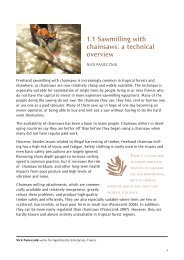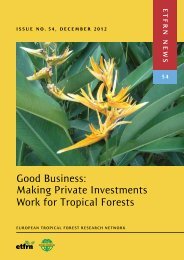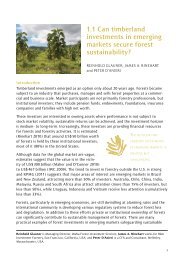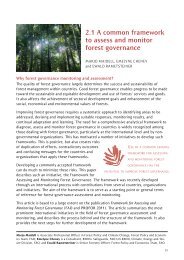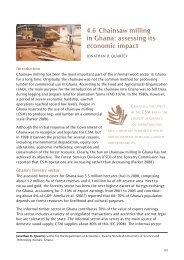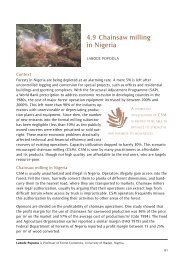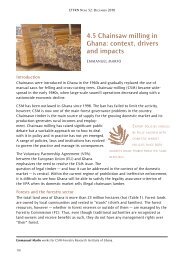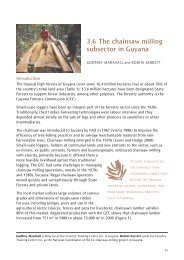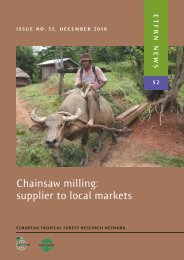Chainsaw milling: supplier to local markets - European Tropical ...
Chainsaw milling: supplier to local markets - European Tropical ...
Chainsaw milling: supplier to local markets - European Tropical ...
Create successful ePaper yourself
Turn your PDF publications into a flip-book with our unique Google optimized e-Paper software.
150<br />
ETFRN NEws 52: DEcEmbER 2010<br />
4.5 chainsaw <strong>milling</strong> in<br />
Ghana: context, drivers<br />
and impacts<br />
EMMANUEL MARFO<br />
introduction<br />
<strong>Chainsaw</strong>s were introduced in Ghana in the 1960s and gradually replaced the use of<br />
manual saws for felling and cross-cutting trees. <strong>Chainsaw</strong> <strong>milling</strong> (Csm) became widespread<br />
in the early 1980s, when large-scale sawmill operations decreased along with a<br />
nationwide economic decline.<br />
Csm has been outlawed in Ghana since 1998. The ban has failed <strong>to</strong> limit the activity,<br />
however; Csm is now one of the main forest governance problems in the country.<br />
<strong>Chainsaw</strong>n timber is the main source of supply for the growing domestic market and its<br />
production generates rural incomes and employment.<br />
<strong>Chainsaw</strong> <strong>milling</strong> has raised significant public<br />
debate but a workable approach on <strong>to</strong> how <strong>to</strong> deal<br />
with it in policy and in practice has not yet emerged.<br />
domesTic markeT<br />
a range of policies, laws and institutions has evolved<br />
<strong>to</strong> govern the practice and manage its consequences.<br />
policies since boTh<br />
exporT policies should<br />
be fully aligned wiTh<br />
markeTs draw Timber from The same<br />
The Voluntary partnership agreement (Vpa)<br />
resource.<br />
between the <strong>European</strong> union (Eu) and Ghana<br />
emphasizes the need <strong>to</strong> resolve the Csm issue. The<br />
question of legal timber — and how it can be addressed in the context of the domestic<br />
market — is central. within the current regime of prohibition and ineffective enforcement,<br />
it is difficult <strong>to</strong> see how Ghana will be able <strong>to</strong> satisfy the legality assurance criterion of<br />
the Vpa when its domestic market sells illegal chainsawn lumber.<br />
Forests and the forestry sec<strong>to</strong>r<br />
The <strong>to</strong>tal land area of Ghana is more than 23 million hectares (ha) (Table 1). Forest lands<br />
are owned by <strong>local</strong> communities and vested in “s<strong>to</strong>ols” (chiefs and families). The forest<br />
resources, however — whether in forest reserves or outside of them — are managed by the<br />
Forestry Commission (FC). Thus, even though traditional authorities are recognized as<br />
land-owners and receive benefits as such, they do not have any management rights over<br />
“their” forest.<br />
emmanuel marfo works for Csir-Forestry research institute of Ghana.



